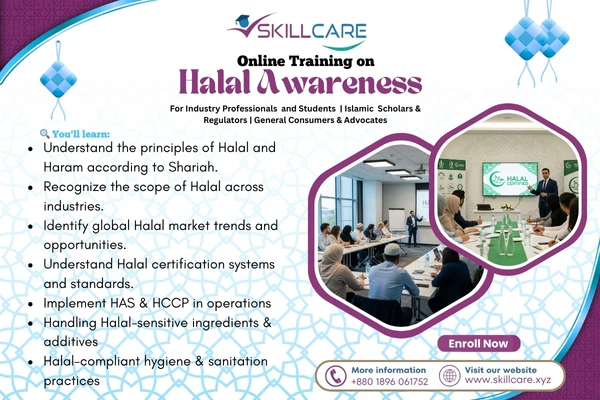Halal Awareness Training
Course Description
This training provides a complete understanding of the Halal concept—its religious foundations, modern applications, industry relevance, and certification processes. It is designed to equip participants with knowledge, practical skills, and compliance awareness to ensure products, services, and processes meet international Halal standards.
- Course Duration: 4 Classes (8 hours total), Class-1: module 1-3; Class-2: module 4-5; Class-3: module 6-7; Class-4: module 8-10
See the module below-
Module 1: Introduction to Halal
Module 2: Foundations of the Halal Concept
Module 3: Scope of Halal Applications
Module 4: Halal Market Overview & Social Impact
Module 5: Halal Certification & Standards
Module 6: Halal Assurance System (HAS)
Module 7: Halal Critical Control Points (HCCP)
Module 8: Ingredients & Additives
Module 9: Halal Processing & Hygiene
Module 10: Staff Awareness & Responsibilities - Mode: Online (Live interactive with guided practical exercises)
- Skill Level: Beginner to Advanced
Who can join?
- Professionals in food, pharmaceuticals, cosmetics, banking, tourism, and logistics
- Students of Food Science, Pharmacy, Finance, Islamic Studies, Shariah Law, etc.
- Religious scholars, community leaders, regulatory authorities
- General consumers and Halal awareness advocates
Course Outcomes
By the end of this program, participants will be able to:
- Understand the principles of Halal and Haram according to Shariah.
- Recognize the scope of Halal across industries.
- Identify global Halal market trends and opportunities.
- Understand Halal certification systems and standards.
- Implement Halal Assurance Systems (HAS) and Halal Critical Control Points (HCCP) in operations.
- Recognize and handle Halal-sensitive ingredients, additives, and processing requirements.
Apply Halal-compliant hygiene and sanitation practices.
Course Faq
1. What is a Halal Awareness Training Program?
It is a training designed to educate employees or participants about halal principles, halal food handling, certification processes, and compliance requirements in production or service industries.
2. Who should attend this training?
Employees in food industries, restaurants, hospitality, supply chain, pharmaceuticals, cosmetics, and anyone responsible for halal compliance or serving Muslim consumers.
3. Why is halal training important?
It ensures that food and products meet halal requirements, builds consumer trust, avoids non-compliance issues, and supports companies in accessing the global halal market.
4. What topics are covered in the training?
Introduction to halal & haram, halal standards, certification process, slaughtering practices (for meat industry), cross-contamination prevention, labeling, documentation, and best practices.
5. How long is the training?
Duration can vary, but typically it ranges from 2 hours to a full-day session depending on the depth of coverage and organizational needs
6. Is there a certificate provided after completion?
Yes, participants will receive a certificate of completion after successfully finishing the training.
7. Do I need any prior knowledge before attending?
No prior knowledge is required. The program is designed for both beginners and those who want to refresh or deepen their understanding.
8. Will the training include practical examples?
Yes, real-life examples and case studies are usually included to help understand implementation in workplace environments.
9. Can this training be arranged for a specific company or organization?
Yes, customized in-house training sessions can be organized based on industry type and staff requirements.
10. Is this training recognized by any Halal certification bodies?
Depending on the training provider, the course may be aligned or recognized by local or international halal certification authorities.

Hardson Smith
a week agoSynergistically than scalable platforms. Conveniently visualize installed online theproducts interactive results. Collaboratively corporate experiences open is applications.






